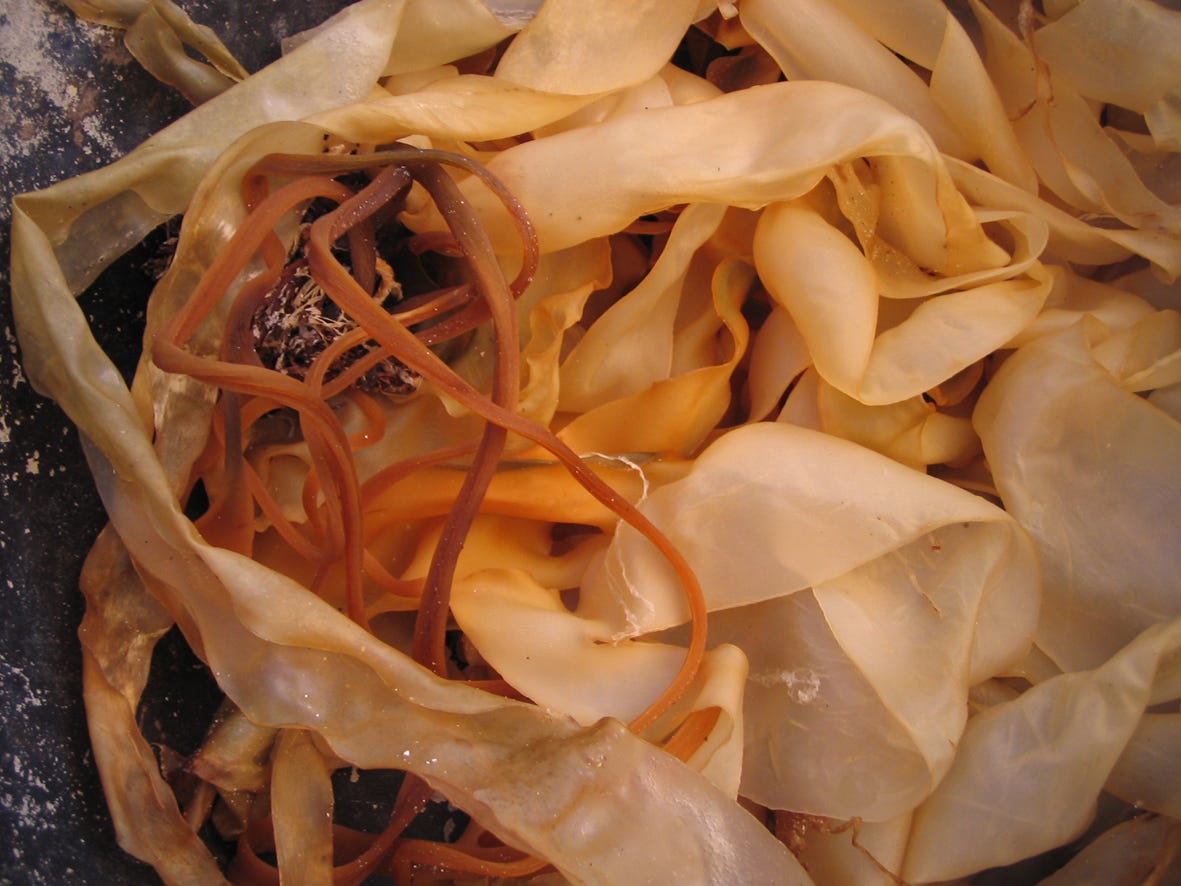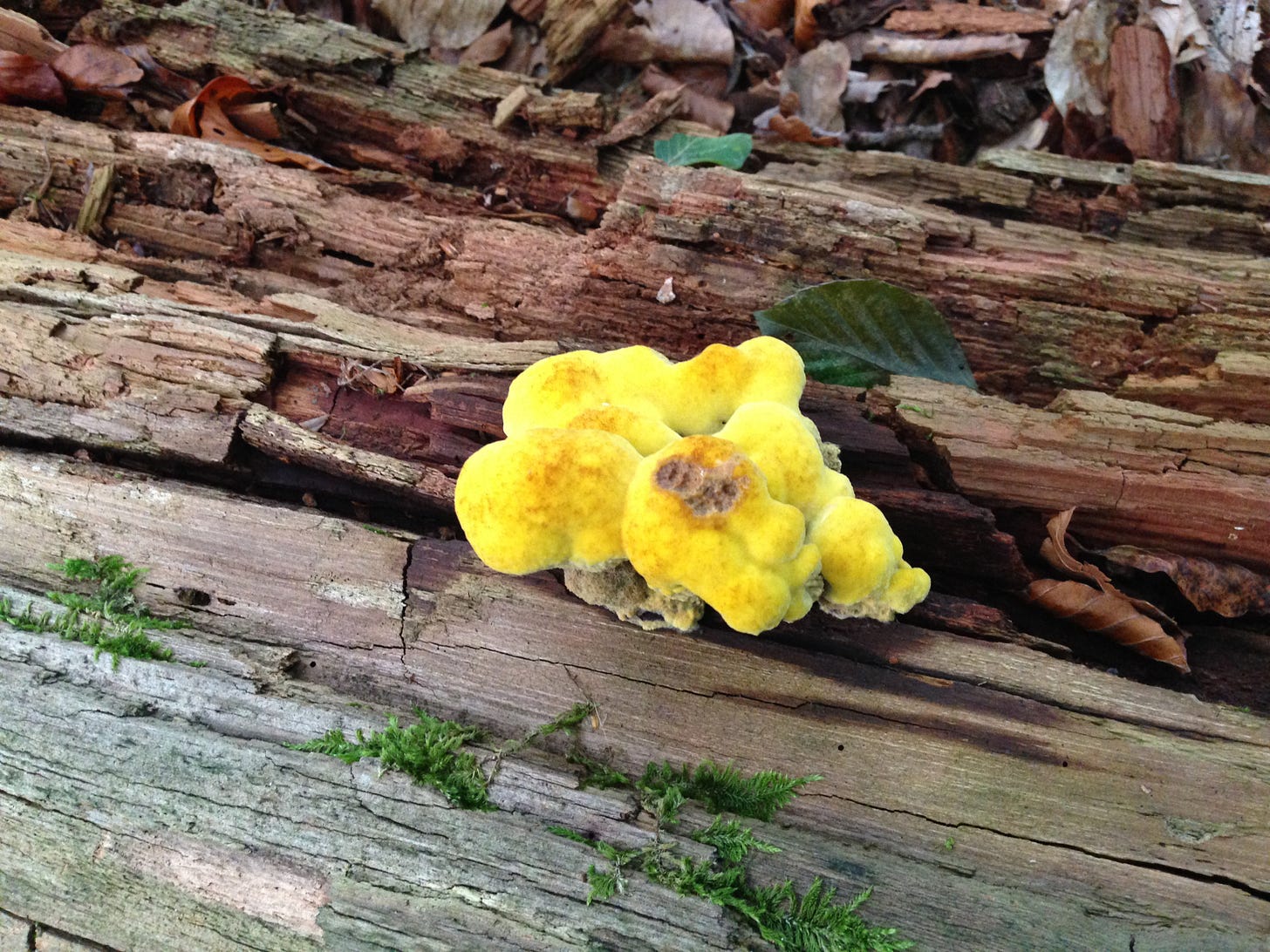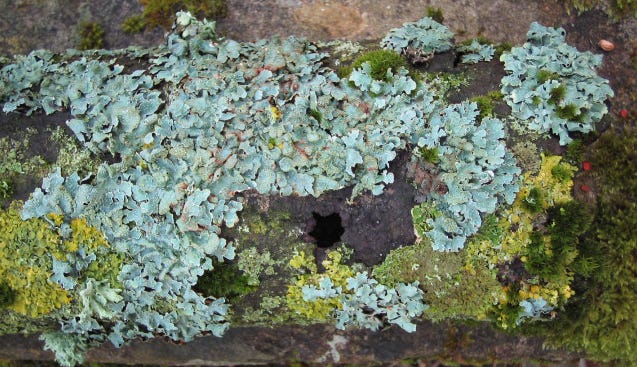I have been thinking about thinking. This is nothing new. A couple of decades doing T’ai Chi with the cotton-slippered elephant in the room being my own tedious thoughts going round and round was, as you can imagine, educational. Over the years I have approached the use of words by the mind in several distinct ways, some methods were classical meditation techniques taught by my teacher or learned from books. Others were ways which evolved naturally, or which were passed on by friends. Yet others were what the woods and the water told me to do, or what Dreaming Caro advised. Below I am going to write about what we can do when we are exhausted by our own minds, especially by intrusive, discursive thoughts (as opposed to useful, bounded, clear thinking).
I do not seek to demonise thought. Thinking, whether in words or other symbolic languages (mathematics, choreography, colour, form, music) is a joy, and a human birth-right. In my experience, the most draining habits of the untrained mind are the cultivation and maintenance of opinions.
We cannot eradicate opinions, no more than we can, or should, seek to kill every insect that ravages our garden or a farmer’s fields. Monoculture tries this, and we all pay the price in water quality, pesticide residue and loss of wildlife diversity. But what about when, metaphorically, we are plagued by our own and other people’s opinions? When thoughts evolve into destructive swarms which eat our energy, as hungry as any cloud of locusts. When we feel ill and drained as though with Lyme’s, passed on by ticks.
What about when one's own thoughts are the parasites?
Feeling is bodily
Firstly, I’d like to clarify a few terms about thinking and feeling, and how I tend to use them, which may be different from how others define things. I very much like two writer’s takes on the terms ‘feelings and emotions’ and ‘reason and rationality’. Charlotte Joko Beck was an American Zen teacher and writer whose books Everyday Zen and Nothing Special are still found on my bookshelves long after all inessential books got sold during hard times.
Beck describes feelings as sensations which spontaneously arise in the body and as such are natural and responsive to the present moment, as well as to memory, connection and a host of other contexts.1 Emotions, according to Beck, are a feeling + a thought, and so are slightly further along the evolutionary line, and somewhat later in timing. For instance, if I trip over a paving slab on the street and my shopping spills out on the ground, adrenaline causes my cheeks to flush and my stomach feels tight almost immediately. Only after I feel this does the little voice in the head say, ‘Well, this is so embarrassing! What an idiot! I am so stupid…’ and so on. ‘Embarrassment’ is the emotion; heat, tightness and raised pulse are the feelings, among so many others. They are not so easily separable, of course, and perhaps should not always be. There’s the old meditators’ joke:
The Zen student is sitting in his house, assiduously labelling his sensations: warmth… heat, difficulty breathing, unpleasantness, crackling sounds, great heat, burning… until his housemate runs in with a fire extinguisher and puts out the flames his incense had ignited in the curtains behind the altar.
Sometimes ‘just noticing’2 is not enough, and pattern recognition, assumptions based on experience, and deductions about probabilities3 are exactly what we need. Nevertheless, the terms ‘feelings’ and ‘emotions’ are useful to help us get a grip on the drain on our energy that some thoughts can have. For example, simple feelings don’t easily turn themselves into states which can possess and exhaust us. To get in a right state as a teenager, as my mother called it, I would have to go through several levels of emotions, with more and more layers of thought, analysis and a dollop of woe-is-me, plus a smear of this-always-happens and then I could guarantee being in a state for a few hours, or even days. The initial prompt - some unkindness or imaginary slight, would cause an emotional response to balloon out of all proportion, and tellingly, no longer be tethered to the original cause, or be lessened by time passing. The English term ‘upset’ is so perfect for this: it’s a set up. We spill out and drain away, wasting our energy like good wine from a glass, and if we are unlucky, breaking the glass, too. And now we have a whole internet of content designed specifically to upset and cause offence to almost every kind of person. The best you can say about it is that the web is at least an equal opportunities offender.
Be reasonable
Secondly, I’d like to mention Iain McGilchrist’s nice use of reason and rationality. Rationality is the measuring, calculating aspect of mind (ratio) that believes its view is objective and unbiased.4 True reason is not just rationality, but must also draw from intuition, inference, context and nuance.5 People sometimes use ‘rational’ when they mean ‘reasonable’, and vice versa. When I say ‘reasonable’, I mean a genuine synthesis of heart-mind (hsin or xin in the Taoist Classics) and intent (i or yi), and this is pretty close to saying that the head and the heart are in accord about the matter at hand.
For me, pure rationality and un-tempered emotion are alike in one interesting way: they are both manifestations of the simplifying, generalising tendency of the left hemisphere to overlay a neatly labelled map onto the strange and ever-changing territory of real lived life. Both rationality and emotion say, ‘I know it all. This is how it is!’
Whereas reason takes into account context, and allows for change, and when we are not overwhelmed, feelings naturally arise and then pass away. In an alchemical sense, they both partake of True Lead - the true sense of real knowledge, something experienced in the body. 6
The infestation
We open our laptops; opinions, facts, lies, jokes, reactions, hot takes, truths, wishes, demands, pleas and bribes spill out of the screen and into our minds. Unless you have very good discernment about how you are using your networked device, this is somewhat inevitable. Luckily, I have an aversion to both online video content and to busy or cluttered graphic design, which means I have never used Facebook, loaded the MSN front page, nor set up any ‘feeds’ or similar scrolls of doom. I have leveraged this aversion and indeed indulged it, (the same way I did with cigarettes, so I still haven’t tried one, aged 51.) One of the main original draws of Substack was the clean, simple design and lack of moving features on the page.
is still an oasis of visual peace, I hope very much it stays that way, as it means I can concentrate on what people have written, rather than fight another migraine-inducing pop-up.However, if we move through a selection of virtual spaces, we too will catch a few opinions, even if we were pretty sure that this morning all we had in mind was how we’d like our eggs cooked. This is how the ticks get on us as we pass through the places that are dense with bristly undergrowth. They just wait there with their little legs extended, ready to hop on us and suck our blood. Excuse the grisly analogy, but it’s genuinely how I feel when I get possessed by my opinions, or indeed, catch someone else’s.
Chips with everything
Here’s another useful distinction, the one between a standpoint and an opinion. It’s really helping me get over a severe bout of inflammation of my opinion vessel (galled-bladder, perhaps?) about a certain matter that is always in the news at the moment. Having a standpoint can be based on facts, experience, learning, discussion, study, research, culture or intuition, and may include other ways of accessing wisdom which are unique to certain contexts and people, such as entheogenic knowledge or traditional Indigenous beliefs. A standpoint is the provisional and bounded place where we currently stand on a matter. Some things may remain our firm view for an entire lifetime; perhaps an ethical conviction, such as that murder is always wrong, for instance, or that wealth should not be hoarded by a tiny group of humans to the detriment of all other beings… But these need not become opinions. A standpoint is a place to look out from, a place to move from, if someone takes the time to lead us to the place they are looking from. It implies a territory, history, companions, and the idea that one could possibly stand in another place, perhaps even in another’s shoes…
Opinions are more often like a shell - an explosive shell, rather than a sea shell. We can bombard others with them, or be bombarded by them. They are hard, uniform and exchangeable. They can be manufactured, traded, dumped or weaponised. They often leave a toxic trail. They routinely detonate in previously calm meetings and have everyone running out the door determined never to work together again. Their fuel cells can be made of emotion, rationality, dogma, superstition or other rare earth metals such as nationalism or entitlement. They can even be powered by the fat dripping off that chip on my shoulder.7
I feel I can speak about opinions with some authority, having been, and occasionally still being, one right-opinionated-git. What it took me too long to notice was the effect of the upkeep of these opinions on both my mental health and the people around me. On the blessed times I have been in company good enough to be able to change my mind on the fly, let go of an outdated opinion, or simply return to not-knowing what I think, the relief in my body has been palpable. It is a life-changing insight.
So what’s going on here? My opinions feel like calcified, hardened versions of perfectly reasonable standpoints. They are shaped for defence, but they are clumsy weapons, like a mace or club. I am not arguing for some vacuous moral equivalency, after all, there are things ‘up with which I will not put’. But, even if I disagree with you, if I can see where you are standing, I might see who stands there with you, or get a sense of how you got to be standing there, and imagine what things might look like from over there. That’s not defending harm, it’s refusing to dehumanise people. 8
(Don’t) mind weeds
I know ticks have a bad rep. I am afraid I can’t help. I know half a dozen people whose lives were ruined or severely impacted by Lyme disease, even when it was correctly diagnosed. Chronic fatigue, palsy, neurological damage, and once even possible alpha-gal, where they got a sudden allergy to eating meat. So when I compare the effects of rigidly held opinions on our minds, energy and well-being to Lyme disease, I am not being flippant. When I think of the most tired, angry, worn out people I know, it is mainly their mental habits that make them that way, not an illness.
I think we need to keep gently checking ourselves for mental ticks and removing them. It’s not a once-and-its-done procedure, as every time we are exposed to the factory farmed troll-fields where these opinions hatch, we have to check again.
Silence, retreats and unplugging our devices are very good treatments as well as being beneficial to our organisms, more generally. Nature itself is the greatest heart tonic. But these methods are not meant to be used like antibiotics. Unless we become hermits, we are to be here in the world, even if we are not of the world, as Stoic, Taoist and Orthodox Classics state. Our work is to be well enough to stay present to the unmade world, even as the made world says, ‘there is no such thing’.
What I am trying out, is mindfully cultivating patches of uncertainty, topics and areas of life about which I refuse to come down on any definitive opinion, even when I am expected to. Even when it is demanded of me to signal what I think so that I can show that I am one of the good guys. This is a very different sensation from ordinary avoidance, where I just don’t think about a thing. And it isn’t a debating society-influenced ‘now I will argue for both sides’ cynicism, as exhibited by half the Westminster ruling class in the UK. It’s more like allowing weeds to grow in my previously monocultural internal lawn of certainty. It’s the hearty / horti - cultural9 equivalent of the doctrine of negative capability, a Keatsian meadow for my mind. Remedies and tonics can be found here, in the dandelions, ribwort, nettle and clover of my unkempt thoughts. They say nature abhors a vacuum. Maybe in the burgeoning mental biodiversity, something will appear which will come and eat all my opinion ticks.
I live in hope.
This week’s good thing: This month sees a great interview with my friend and long-time pigment colleague Tilke Elkins, whose work I have featured here before. It’s a good entry point into all things earth art with links to so many artists and land stewards, I wouldn’t know where to start. I am also happy to say that last month’s Ground Bright pigment which I prepared from a landslide here in Dorset has raised £721 for Right To Roam. Thanks to Tilke and Noelle of Wild Pigment Project for their ongoing commitment to earth, to beauty and community.
It is true that trauma and adversity can send these feelings well out of alignment to the intensity of events in the here and now, but I am not discussing that aspect today. I am referring to feelings as sensations felt in and by the body.
A right hemisphere response from open vigilance, what we in T’ai Chi would call ‘expanded, open awareness’.
Left hemisphere operations based on sorting, comparing and classifying experience in memory to make a guess about what is happening in the present moment.
The domain of the left hemisphere.
The purview of the right hemisphere.
I’ll be writing more about these useful traditional Taoist terms in the summer in relation to the hemispheres of the brain and the ways of seeing the world which emerge from them.
Yes, I know the ‘chip’ here originally referred to a length of wood, not a piece of fried potato. But it made me laugh.
Dehumanising people is a superhighway to great real harm, bloodshed and war. See a large part of 20th Century, for further details.
Wonderful Alys fowler on weeds.










Thanks for your standpoint/opinion distinction. I was going to write about this, maybe, at some point, and am looking for ways to express a similar idea.
Separately, a helpful exercise with difficult feelings, emotions, and opinions, is to allow them to come to mind and then to notice where they settle in the body: often in the stomach, chest, or throat, but sometimes other places, and with a very particular quality.
Being able to put a word or phrase or metaphor to this quality can help release it, especially when the word/metaphor arises spontaneously E.g., “anxiety like a squirming lizard in my belly”, etc, and when the attitude is one of observation and acceptance (not acceptance because we like it, but to avoid clinging to it).
As a much younger woman I often sat in the middle and looked either way, cautious, careful and shy, but also quite wise and considerate as well, I never wanted to foist my opinion on anyone. As I got older somewhere along the line I decided that I needed to be more assertive (oh how I have come to hate that word), and that it was high time I developed opinions! Then as the oestrogen fell away, I pretty much became a gob shite! I am trying to reverse this process, get back to the wisdom of my youth and it's a great idea just to leave things and see what comes. I will also be reading this again and thinking about it all week. Thank you